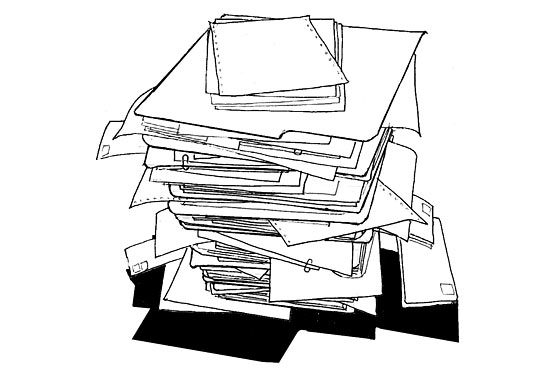
Those of us who watched in horror as the financial system careered toward disaster in 2008 could sense in our bones the presence of not only dishonesty but also chaos in mortgage trading. Last week’s multi-billion-dollar settlement by Bank of America with 22 large investors suggests how deep the problems went. Multiply that by all the investors who were scammed by the big banks, and the potential liabilities are astronomical. The investors involved in the B of A settlement, moreover, include some of the largest and canniest in the market, who were more likely to have reined in their risk in the late stages of the bubble. By then, mortgage-bond salesmen were preying on the least-sophisticated investors, like a Virgin Islands employee pension fund and midsize German banks anxious to play with the big boys.
There are now some 2 million homes in various stages of foreclosure, but revelations of the sloppiness and possible fraud in the processing of mortgages have helped slow the foreclosure machine to a crawl. A loose confederation of the 50 state attorneys general has been negotiating a bank “settlement” that would get foreclosures back on track in return for a penalty payment—$25 billion is under discussion—and some yet-to-be-agreed-upon process reforms. But in addition to easier foreclosures, the banks also want broad amnesty from future federal and state prosecutions. Twenty-five billion dollars might seem like a lot of money, but given the cost of the crisis and what is known about the banks’ behavior, it could be the steal of the century.
Mortgages are ancient instruments, and state mortgage laws are still deeply rooted in the pre-computer era. In most states, an effective mortgage transfer requires all the essential documents, including some in the original. And the laws tend to be strict. If you don’t have the right paper, you often have no rights at all.
At the height of the subprime boom, mortgage-backed securities were sold off in billion-dollar increments, each bundled with thousands of mortgages. That’s a lot of paper files. High-risk mortgages were usually originated by loan companies and banks, then sold to large banks where they were sliced into many “tranches” and deposited with a trust to be held on behalf of investors.
It was a high-speed paper assembly line that ran from the boiler rooms of now-bankrupt originators like New Century Financial through hectic Wall Street trading floors, then to trustees who almost never looked at the documents. Is there any possibility that all these mortgages were properly documented and that all parties in the securitization supply chain maintained diligent control over hundreds of thousands of thick manila folders?
Of course not. The first clue was the revelation that foreclosure-specialist firms were using “robo-signers”—temporary help who knew nothing about mortgages—to sign affidavits by the thousands averring that they had conducted individual searches. The legal team for Charles Schwab analyzed roughly 75,000 loans supporting bonds purchased by Schwab funds and alleged that nearly half were likely to have material discrepancies. A Fortune reporter examined 104 securitized mortgages from Countrywide and found that none had all the documents in order.
The banks pooh-poohed the problems at first but now seem trapped in a morass of their own making. If the trustees did not keep proper records of the securities backed by mortgages, they would have had no legal right to sell mortgage bonds, and investors would then have a good claim to get their original investment back. The dollars there are huge. And there are tax problems. A federal law exempts trusts that hold mortgage-backed securities from taxation provided they have good documents. If the tax requirements weren’t met, stiff penalties might apply.
Some of the attorneys general, especially those from tea-party-dominated states, are pushing for a fast settlement. But there’s no reason to rush into yet another lopsided deal for the banks. New York’s Eric Schneiderman and Delaware’s Beau Biden have been holding out for a settlement that places real, enforceable obligations on the banks. They have considerable leverage, since almost all the securitization trusts are organized under New York or Delaware law.
But the Obama administration has been of no help. A recent vague “settlement” with the banks by John Walsh, acting comptroller of the currency, who sometimes acts almost as a bank lobbyist, may have made the job even harder.
The justification for babying the banks, if there ever was one, is long gone. They’re brimming with cash, and it’s time they did their part to pick up the pieces from the havoc they wreaked. And the attorneys general, if they want to use it, have the clout to make it happen.
Charles H. Ferguson directed the Academy Award–winning Inside Job.